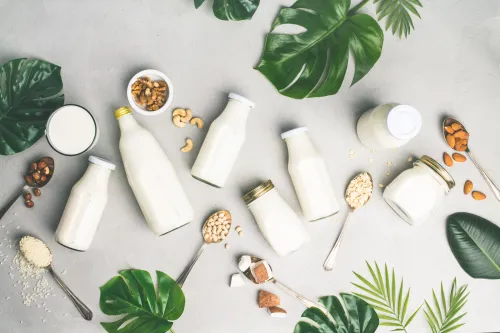A Ranking of All the Dairy-Free Milk Options In Order of Most Protein (and Calcium) To Least
Alt-milk protein content: Here, nutrition experts rank various versions according to their protein and calcium content.

My change-averse father may be irrationally outraged by their existence—“that is not milk,” he bellows whenever I request he purchase almond milk in advance of my visits—but alt-milks aren’t likely to disappear from store shelves anytime soon. In fact, their ranks seem to be multiplying by the day, swelling to include such obscure-yet-thrilling offerings as pili, pistachio, and avocado milks (to name a few).
Experts in This Article
New York-based registered dietitian
plant-based registered dietitian nutritionist and NASM-certified personal trainer
But when blessed with such a vast array of dairy-free milk options, it can be difficult to parse through the health benefits of each in order to select not just your favorite in terms of flavor, but also the one that’s best for your nutritional needs. Ever wondered which mylks have the highest concentration of the nutrients that we once relied upon dairy milk for—namely protein and calcium—and which have the least?
To figure it out, I enlisted the help of nutrition experts Melissa Rifkin, RD and Whitney English, RD. These dietitians ranked the most popular dairy-free milk options by both their protein and calcium content to help you find the alt-milk that’s right for you.
Alt-milk options ranked by protein content
Individual alt-milk brands may vary in terms of their protein content, but here’s a general sense of each milk’s ranking, according to the nutritionist experts. And as an aside, it’s helpful to keep in mind that a cup of cow’s milk contains 8 grams of protein.
1. Soy milk
“Of these alternative milks, soy will have the highest protein content at 8 grams per cup. This is actually very similar to the amount of protein you will find in dairy milk,” says Rifkin.
2. Pea milk
Tied for first place is pea milk which, according to Rifkin, contains about 8 grams of protein per cup as well.
3. Oat milk
“The amount of protein in the rest of these milks will all be quite lower—think 4 grams of protein per cup or less,” Rifkin says. “Oat will hover between 3 to 4 grams.”
4. Cashew milk
4 grams of protein per cup.
5. Hemp milk
3 grams of protein per cup.
6. Flax seed milk
3 grams of protein per cup.
7. Chia milk, Avocado milk, Pistachio milk
2 grams of protein per cup.
8. Almond milk, Banana milk, Rice milk, Coconut milk
Under 2 grams of protein per cup.
Calcium content of non-dairy milk options
It’s more difficult to outright rank alt-milks from a calcium standpoint, say both Rifkin and English, as most are fortified with calcium to create a similar calcium profile to what is found in dairy milk (about 300 mg per cup).
“Calcium content varies widely depending on fortification practices,” says English. “Unfortified products contain negligible amounts of calcium. Fortified products typically have about 20-40 percent of your recommended daily value (DV) of calcium per cup.” The DV for calcium is 1,300 mg for adults and children age 4 and older.
Ultimately, Rifkin estimates that the most common alt-milks—including oat, almond, soy, coconut, and rice—range from 300-450 mg of calcium per cup, thanks to fortification. “But again, because calcium content will vary widely from brand to brand, it’s important to check nutrition labels if calcium is a nutrient you are keeping an eye on,” she says.
English agrees, emphasizing the importance of tracking your calcium consumption if you typically follow a plant-based diet. “Calcium needs can be more difficult to meet on a diary-free diet,” she says. “Especially for young children.”
If you are hoping to up your plant-based calcium intake, she recommends tofu, white beans, collard greens, kale, tempeh, and figs. You can also make yourself a couple of additional lattes with your fortified alt-milk of choice—with so many delicious options available, why not?
Oh hi! You look like someone who loves free workouts, discounts for cult-fave wellness brands, and exclusive Well+Good content. Sign up for Well+, our online community of wellness insiders, and unlock your rewards instantly.
Sign Up for Our Daily Newsletter
Get all the latest in wellness, trends, food, fitness, beauty, and more delivered right to your inbox.
Got it, you've been added to our email list.










